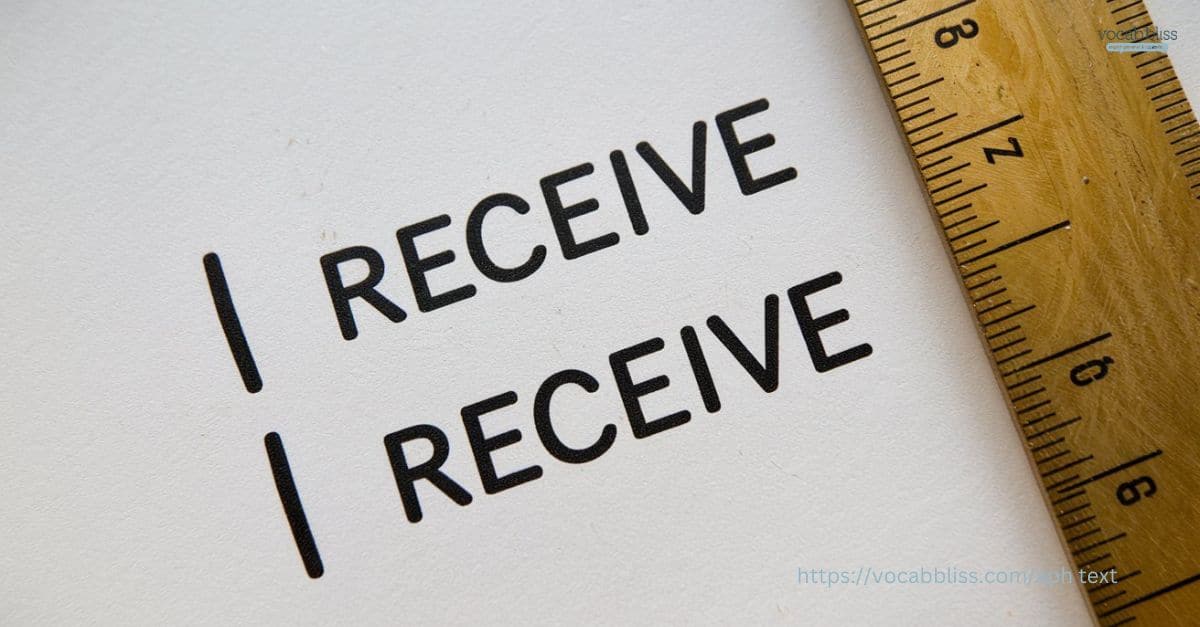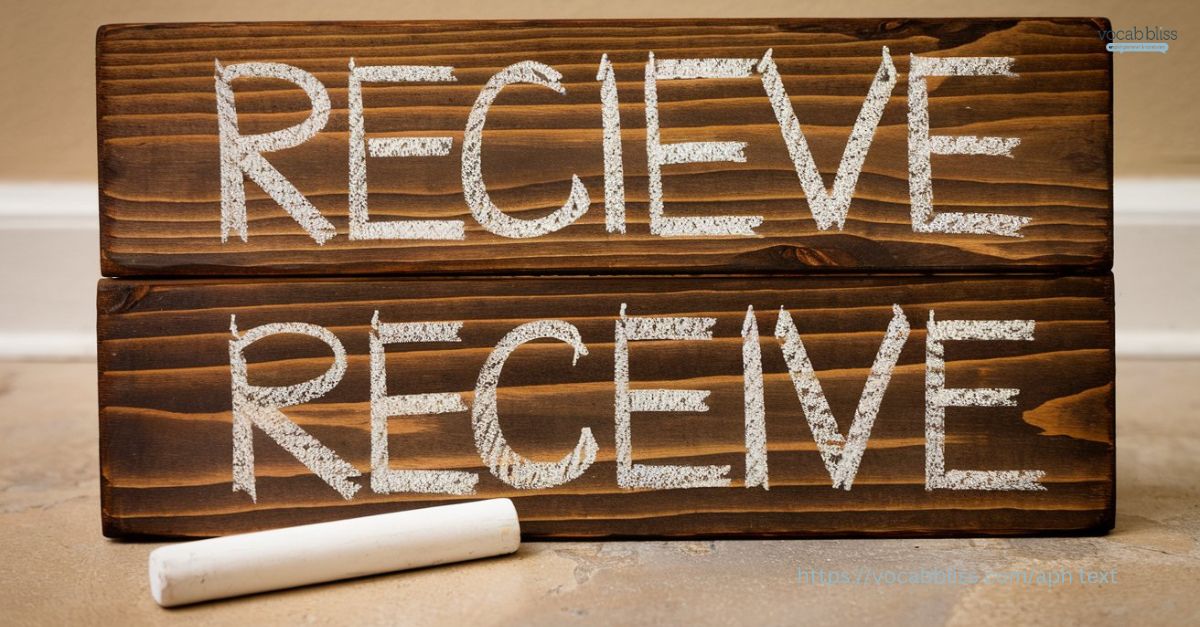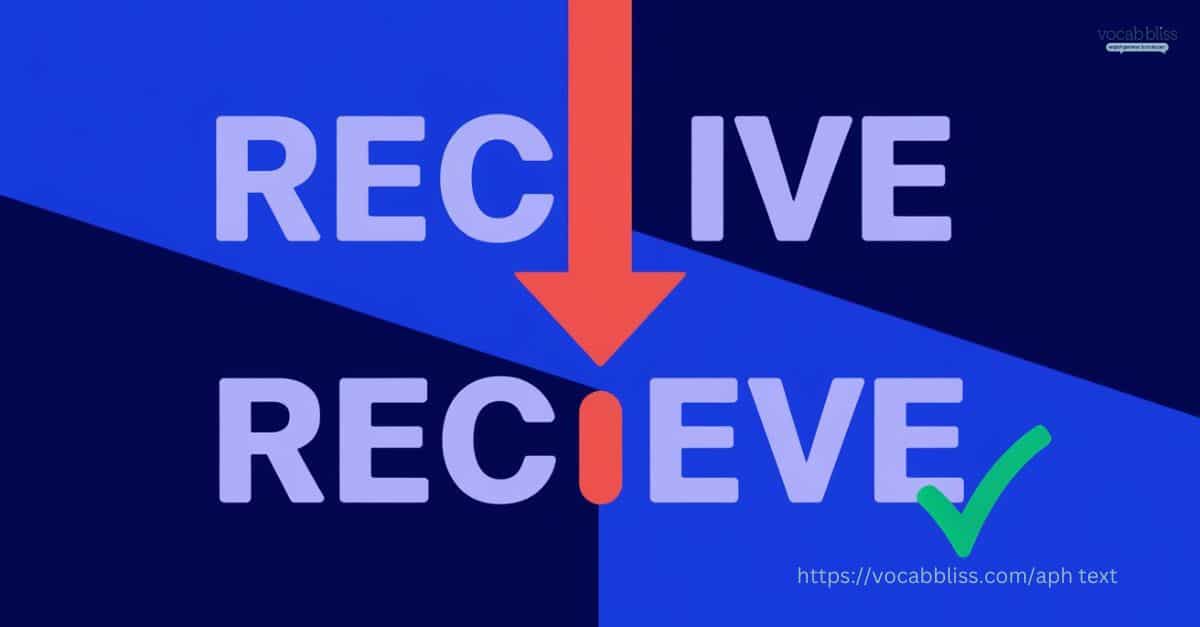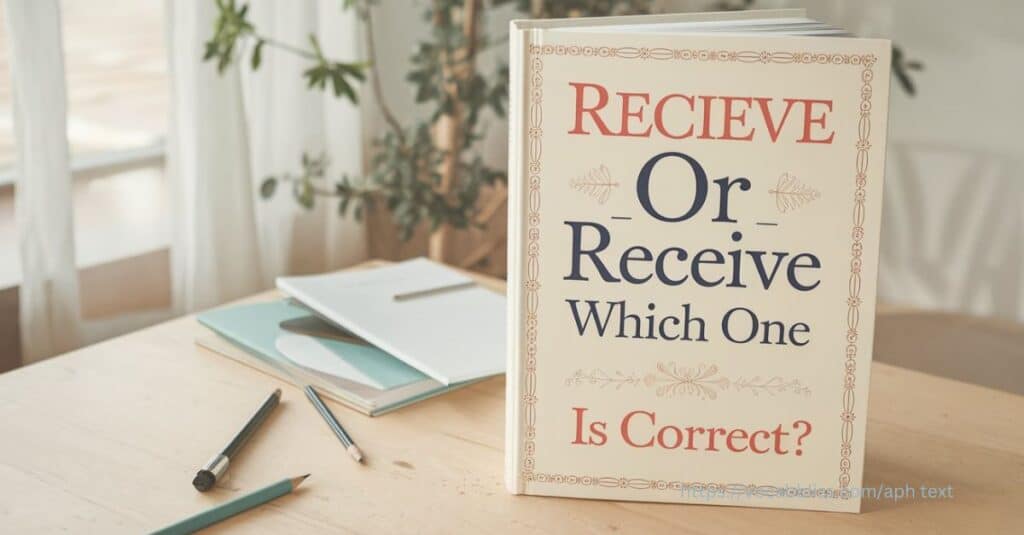Spelling mistakes can be frustrating, especially when they keep popping up in your writing. One such error that many people struggle with is “Receive or Recieve” Whether you’re composing an email, writing an essay, or drafting a report, using the wrong spelling can make a poor impression.
In this guide, we’ll first clear up the confusion and explain why one of these spellings is right and the other isn’t, while also providing helpful tips to avoid making this mistake in the future
Understanding the Confusion Between ‘Recieve’ and ‘Receive’
Before we dive into definitions, let’s first understand why this error happens so frequently. To begin with, the English language is notorious for its irregular spelling rules, and the confusion between “receive” and “recieve” is a perfect example of this dilemma. As a result, many people struggle to remember the correct spelling
Why Is This Error So Common?
The spelling mistake arises mainly because of English’s spelling rules, specifically the “i before e, except after c” rule. Many learners of the language and even native speakers get tripped up by this. While this general guideline helps in most cases, it has several exceptions that can make things confusing.
For instance, consider words like “their” or “weird,” which don’t follow the typical “i before e” structure. In the case of “receive,” since the word follows the letter “c,” the correct spelling places the “e” before the “i.” Understanding this rule and its exceptions can help clear up confusion.
The Role of Phonetics in Misspelling
The way “receive” is pronounced adds to the challenge. Both “receive” and “recieve” sound identical when spoken aloud, which can lead to spelling errors when writing. English speakers often rely on phonetic patterns when spelling words, which doesn’t always work due to the irregularities of English spelling.
‘Recieve’: Why This Spelling is Incorrect
Breaking Down the Error
Receive” is not a word recognized in standard English usage, and if you type it into a spell-checker, it will get flagged as incorrect. However, it’s an understandable mistake, especially for those new to the English language or who aren’t familiar with the spelling rules.
One key reason for this error is the misapplication of the “i before e” rule. In the case of “receive,” because the word follows a “c,” the correct order is “e before i.” Therefore, learning this pattern is crucial for avoiding the mistake

Read More: Tomorrow or Tommorrow: Which One Is Correct?
Common Reasons People Misspell It This Way
- Relying on Phonetics: When people spell based on how a word sounds, they might not realize that some English spellings don’t align with their pronunciation.
- Misapplication of Spelling Rules: Assuming the “i before e” rule applies in every case leads to errors.
- Lack of Attention to Detail: When writing quickly, people often miss subtle spelling differences.
Examples of Incorrect Usage
“I hope to recieve your response soon.”
“She didn’t recieve the package yesterday.”
In both sentences, the correct spelling should be “receive.”
‘Receive’: The Correct Spelling and Its Meaning
What Does “Receive” Mean?
The word “receive” means to get or accept something that is given, sent, or awarded. It can refer to physical items, messages, information, or even experiences.
Etymology and Historical Usage
“Receive” comes from the Old French word receivre, which itself has Latin roots in recipere (to take back or regain). By tracing the origin of the word, you can better grasp why it’s spelled in a seemingly irregular way. Moreover, knowing its history sheds light on the unique spelling pattern it follows. Thus, understanding the etymology can help reinforce correct spelling
Pronunciation Guide and Syllable Breakdown

- Pronunciation: /rɪˈsiːv/
- Syllables: re-ceive (2 syllables)
By breaking down the syllables and practicing the pronunciation, it becomes easier to remember the correct spelling.
Common Synonyms and Related Terms
- Accept
- Get
- Acquire
- Obtain
- Collect
Knowing these synonyms helps ensure you’re using “receive” correctly in various contexts.
Understanding the Spelling Rule and Its Exceptions
The “I Before E Except After C” Rule Explained
The rule is typically stated as: “i before e, except after c, or when sounded as ‘ay’ as in ‘neighbor’ and ‘weigh’.” While this guideline covers many words, it isn’t foolproof.
| Word | Follows Rule? | Notes |
|---|---|---|
| Receive | Yes | Comes after “c,” so “e” before “i” |
| Believe | Yes | “i” before “e” because it doesn’t follow “c” |
| Weird | No | Exception to the rule |
| Seize | No | Exception to the rule |
Other Exceptions to the Rule
Here are some common exceptions:
- Weird
- Seize
- Leisure
- Foreign
Tips for Remembering the Correct Spelling of “Receive”
- Mnemonic Device: “You receive before you believe; remember the ‘e’ before ‘i’.”
- Visual Cues: Picture the “c” as a “gate” that the “e” goes through first.
- Repetition: Writing out the correct spelling multiple times can help reinforce it.
Side-by-Side Comparison: ‘Recieve’ vs. ‘Receive’
| Aspect | Recieve | Receive |
|---|---|---|
| Correctness | Incorrect spelling | Correct spelling |
| Part of Standard English | No | Yes |
| Follows Spelling Rules? | No | Yes |
| Recognized in Dictionaries? | No | Yes |
This table shows a clear distinction between the two spellings. It’s helpful to visualize these differences to avoid confusion.
Everyday Usage Examples of ‘Receive’
Correct Usage in Sentences
- “I will receive the documents tomorrow.”
- “He received a warm welcome from the team.”
- “Please confirm that you have received my email.”
Contexts Where “Receive” Is Commonly Used
- Email Correspondence: “Did you receive the attachment I sent yesterday?”
- Formal Writing: “The recipient will receive the award during the ceremony.”
- Conversational English: “I didn’t receive any calls today.”
Tips for Self-Correction When Writing
- Use Spell-Check: Most word processors will flag “recieve” as a misspelling.
- Proofread Carefully: Pay extra attention to words that are commonly misspelled.
- Practice Writing Out Correct Spellings: Especially for words you often misspell.

Common Mistakes and How to Avoid Them
Other Frequently Misspelled Words
The English language has plenty of tricky words. Here are some other words often misspelled due to similar issues:
- Definitely (often spelled “definately”)
- Embarrass (often spelled “embarass”)
- Separate (often spelled “seperate”)
Proofreading Strategies for Catching Spelling Mistakes
- Read Backward: Reading the text from the end to the beginning helps spot individual word errors.
- Use Spell-Checking Tools: Grammarly, Microsoft Word, and other apps can catch spelling errors.
- Have Someone Else Read It: A fresh set of eyes might catch mistakes you’ve overlooked.
Recommended Tools or Apps for Spell-Checking
- Grammarly: For grammar and spelling suggestions.
- Microsoft Word: Built-in spell checker with real-time suggestions.
- Hemingway App: Highlights complex sentences and passive voice.
Practical Exercises to Master the Correct Spelling
Fill-in-the-Blank Exercises
Fill in the blank with the correct word:
- “Did you _ the package I sent?”
- “She will _ her diploma next month.”
- “Please _ this letter as confirmation.”

Word Puzzles or Matching Games
Try matching these commonly misspelled words with their correct spelling:
| Misspelled Word | Correct Spelling |
|---|---|
| Recieve | Receive |
| Beleive | Believe |
| Seperate | Separate |
Writing Prompts Incorporating “Receive”
Write a short paragraph using the word “receive” at least three times. Practice using it in different contexts.
Conclusion
Spelling mistakes, such as the confusion between “receive” and “recieve,” can affect the professionalism of your writing. Fortunately, by understanding the spelling rules, using tools for spell-checking, and practicing common English terms, you can improve your spelling accuracy. Moreover, remember that attention to detail in writing helps you maintain high standards in both professional and everyday communication.
When you master commonly confused words like “receive,” you improve your grammar and usage, making your writing clearer and more professional. Keep practicing, use the tips in this guide, and soon, spelling mistakes will be a thing of the past.
With these insights and strategies, you’ll be better prepared to avoid common English errors and maintain correct English spelling in your writing.
Read More
- Piece or Peice? Figuring Out The Differences
- Tying or Tieing? Use the Correct Form
- Journeys or Journies? Breaking Down the Terms
- Leafs or Leaves? Which Form to Use?
- Training or Trainning: Which One Is Correct?

Jorge Phillips is an experienced blogger who writes for Vocab Bliss, sharing his passion for the English language. With a knack for simplifying complex grammar rules and a focus on commonly confused words, Jorge helps readers navigate the nuances of English with ease. His insights aim to make learning engaging and practical.







